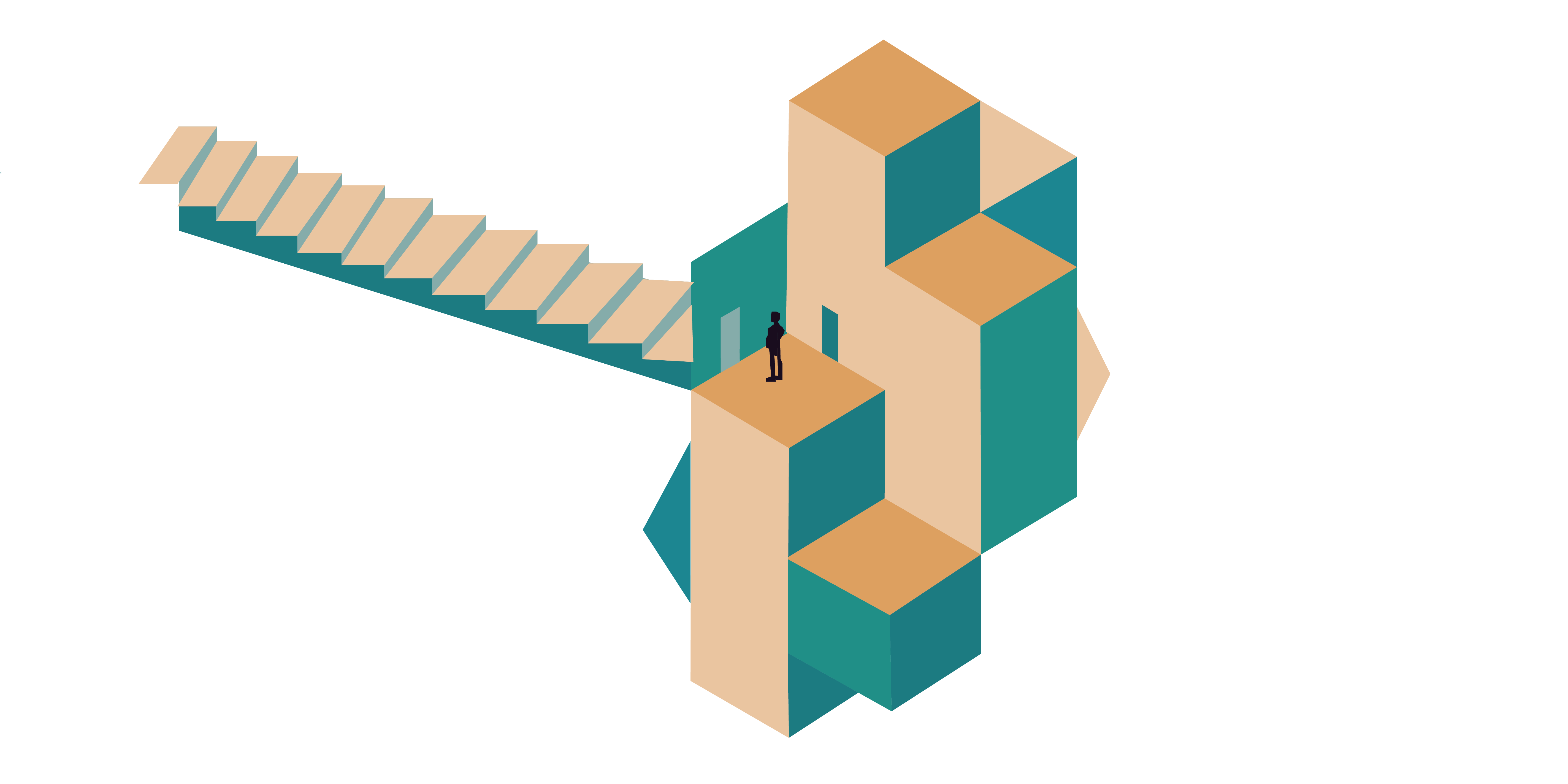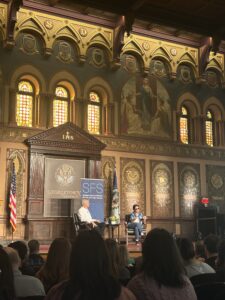A single glance at the Georgetown University Ethics Lab is enough to know it does academic philosophy differently. Their pamphlets, the website, the lab itself all show intentional, consistent branding—sleek, Apple-store white, accented with bright neon circles. The Ethics Lab plucks words like “innovation,” “deep learning,” and “industry disruption” from their homes in business school textbooks and startup company mission statements and applies them to a 2,500-year-old tradition of studying the human capacity for goodness.
Some say this tradition may be dying. Maggie Little, director and founder of the Ethics Lab, disagrees. “We often just think of philosophy as dealing with timeless questions,” she said. “But even in dealing with timeless questions, we make innovations in our theory.” The Ethics Lab is only one effort within Georgetown attempting to grapple with pressures to modernize a traditionally insulated and theoretical discipline. With cash flows to humanities departments drying up, pre-professional pressures rising, and established canons losing authority, philosophy must now reinvent itself.
Philosophy has always been about responding to the messy, granular world, Little says, but the job of the Ethics Lab is to turn those responses into “R&D” (Research and Development, another business term that may not fit familiarly in the mouths of humanities majors). The Ethics Lab was founded in 2012, an offshoot of the Kennedy Institute of Ethics (KIE). The KIE began asking moral questions about medical research early on, in 1972. As the scope of bioethics has grown, the KIE has also expanded its research to environmental ethics, disability issues, and big data.
In the United States, universities are ambitious about their goals. They aim to unite the opposing objectives of public service and economic growth with enriching intellectual experiences and socially engaged research. But they also churn out future entrepreneurs, financiers, and CEOs, who will elevate the status of their alma mater and compete in the global economy.
But as public funding for higher education shrinks, as universities embrace business principles, and as tuition costs grow, intellectual enrichment without concrete dividends becomes harder to justify. The number of philosophy majors has dropped 15 percent in the past 10 years. It’s become painfully clear that philosophy, along with all the other humanistic disciplines, was birthed in the minds of people who didn’t have to worry about their student loan debt or health insurance, within institutions that knew nothing of endowments and U.S. News & World Report rankings.
In recent years, dozens of think pieces have lamented the impending doom facing the humanities. And while the headlines can be dramatic (“Making Philosophy Matter—or Else,” “The Humanities are Dying, Poisoned by Faculty,” etc.), they’re responding to a real problem. In 2011, the University of Nevada, Las Vegas came close to eliminating its philosophy department due to budget cuts. In 2018, Claremont Graduate University closed its department. According to the American Philosophical Association (APA), at least nine philosophy departments have been threatened with restructuring or elimination since 2010.
The Ethics Lab attempts to address this dilemma by serving a dual purpose—as an educational program within the philosophy department, and as a think tank that advises policy and government organizations and tech companies on various ethics-related issues, from the use of artificial intelligence to political polarization on the internet. The Lab’s courses range from bioethics to political epistemology to environmental ethics, sharing the common denominator of an emphasis on practice, solutions, and real-world applications.
Beyond the trendy aesthetic, the Ethics Lab seems an evolutionary triumph, a display of traits ideal for adapting to the pressures facing philosophy and the other humanities in today’s academic landscape.
“Philosophy is kind of a sinking ship for a lot of reasons, one of those being that it’s existing within this capitalistic university system,” said Shelbi Nahwilet Meissner, an assistant professor in the philosophy department. Coming from public universities, Meissner knows the pressure budget cuts place on university administrators. “Some administrators will talk about philosophy and how it’s not bringing in money to the university,” she said. “Whether we want to say that’s an ethical way of valuing something doesn’t really matter, because it’s the way the system does it.”
Many professors pointed out that these economic pressures affect students as much as they impact departments and scholars, and they’re right. Students are encouraged to be curious and passionate about learning, but are also constantly reminded of the need to turn themselves into attractive future employees. This makes even the students who go in wanting to study the humanities prioritize economic and practical value.
Though the forces of marketization are doing their fair share to undermine the value of studying philosophy, the crisis in the humanities is not just a financial matter. It’s also a reflection of a deeper moral and epistemological identity crisis about the way philosophical knowledge is produced, by whom, and for what purpose.
“Philosophy is documentedly still the whitest and most male-dominated discipline, and that’s not a coincidence,” Nahwilet Meissner said. “It doesn’t have anything to do with student preferences or student abilities. It has much more to do with the very particular type of tradition and the ideas that it has uplifted.” In 2018, members of the APA were 73 percent male and 75 percent white.
“When people talk about ancient philosophy, someone who works on Buddhist philosophy or maybe teaches Native American philosophy doesn’t usually count, because that’s not what they mean,” she added. By a recent informal count, Nahwilet Meissner is one of only four Native American philosophy PhDs in the entire U.S. university system who works in a philosophy department.
The homogeneity of the people producing philosophical work throughout history makes it hard for professors to add diverse voices in a genuine way, and students have noticed. “We all have to take ancient and medieval philosophy, which is Plato, Aristotle, and a bunch of Christian monks writing in the Middle Ages,” said Mark McNiskin (COL ’20), a philosophy major. “And then we take early modern philosophy, which is like Kant and Descartes. My professor tried to include some women, but there honestly just weren’t that many writing at the time.”
As many academics have acknowledged, it would be naïve and dishonest to maintain focus on a canon that has been widely accepted as valuable while knowing how many people’s ideas have been excluded from it. It feels equally wrong, however, to reject theory completely and resign philosophical endeavors of defining goodness and ethical behavior to matters of subjectivity or individual taste.
Injecting some empirical certainty and application into theoretical inquiry, then, seems like a good way out of this dilemma. Real-world engagement claims a legitimacy that narratives and theories do not, and Georgetown’s mission of marrying theory with practice has positioned its philosophy department to weather the pressures of staying relevant.
The humanities have always been a pillar of Jesuit intellectual tradition, but so has service to others. Engagement with concrete societal problems has permeated the philosophy department through the development of bioethics and the idea of “people for others.”
“I think a lot of the push in our department for focusing on practical problems comes from Georgetown’s social justice commitments,” said Karen Stohr, an associate professor of philosophy. “There’s this idea of our moral imperative to use whatever skills we have to help people, to alleviate suffering.”
Indeed, activism is an important and growing facet of philosophical research at Georgetown. Philosophy professor Mark Lance, who also helped found the Justice and Peace Studies program, is currently writing a book for activists on how to build a movement that’s actually meaningful and revolutionary. Meissner explores meaning-making mechanisms in indigenous language activism, and Quill Kukla, another professor in the department, works on issues of sexual consent and agency.
But McNiskin recognized that traditional texts can serve as springboards for perspectives only philosophy can provide. “As much criticism as there is of the canon, it can be an interesting way for people to distance themselves from current discourse on issues and see them in a new light,” he said.
Asking questions about real examples of injustice and being in conversation with marginalized communities certainly helps address the crisis of intellectual legitimacy and dispels tropes of a disconnected and insulated discipline, but it hardly makes philosophy more marketable for students or lucrative for Georgetown.
The Ethics Lab, on the other hand, does. Kevin Berning (COL ’20) spoke to the practical edge Lab classes have. “Bioethics was probably the reason I decided to be a philosophy major. It was really practical,” he said. “Whenever I go home I get the typical ‘Oh, philosophy, what are you going to do with that?’ And I ask myself the same question. So actually getting to apply the ideas to real issues was nice.”
Empirical reality and application are part of the Lab’s brand. Everything can be counted, and is in a report on the think tank’s first three years—from the number of books in the Lab library (650) and number of visitors to Lab events (1,632), up to the number of Post-it notes “put to good use” (68,357). This presentation of smarter, better, faster philosophy is alluring, and not only to students like Berning.
Georgetown alumni have consistently donated to the Ethics Lab, and many of them work in the fields the Lab examines. Past donors include Silicon Valley venture capitalists, insurance company executives, branding consultants, and, perhaps most notably, the CFO of Facebook. The Lab returns the favor by sending graduates to advise the industries they’ve been studying. “We want to help develop the next generation of people that should go into Silicon Valley and be leaders,” Little said.
For Twitter CFO Ned Segal (COL ’96), the budding relationship between philosophy and Silicon Valley is mutually beneficial. “Technology companies can benefit from the knowledge that ethicists can apply to difficult decisions that these companies can be faced with,” he said. “Ethicists benefit because tech companies help challenge and introduce new issues for the ethics field to consider.”
Little acknowledged the importance of outside donors to the Ethics Lab. “We have ambitious hopes for the Lab and for its capacity to train students in the most pressing ethical issues,” she said. “But it’s all soft money. It’s donor money. So it depends on how our campaign for it goes.”
As technology continues to permeate the most intimate parts of our lives, philosophers and ethicists could indeed provide some useful input. The fact that research on the ethics of data and artificial intelligence is being funded is overall a good thing, Stohr said. “It’s clearly a huge ethical issue and people haven’t been thinking about it much and there’s a lot of public concern about it.”
But the closer this relationship becomes, the more philosophers have to consider conflicts of interest and financial connections that haven’t historically been worries in their discipline. “In the past, no one has been dying to give philosophers grants, and that’s kind of liberating because it does leave us a little bit freer to do what we want,” Stohr said. “Once there’s money involved, people’s priorities can definitely shift, even if it’s not consciously, it still shapes the questions that are funded.”
With issues surrounding Silicon Valley, journalists and scholars have pointed out that soliciting their own philosophy research and creating internal ethics review boards allow companies to avoid more impartial scrutiny and regulation by the government.
Underlying these concerns is the fear that philosophical inquiry and the internal mechanisms of businesses are incompatible. Tech companies are driven by profit, fast solutions, and the affirmation that their products are ultimately good for society. This doesn’t always mesh well with ethical inquiry, which takes time and often can’t be condensed into a digestible algorithm. Perhaps most importantly, tech companies mostly ask ethicists to fix bias or problems within their programs, rather than question whether these programs should exist in the first place.
And just like that, the ivory tower is dismantled only to reveal a completely different set of problems, leaving philosophy in a perpetual balancing act.
“Engaged philosophers need to be able to keep an eye on the risk of becoming too one-sided, of not being reflective and critical enough of what they’re engaged with,” said Blattner. “But there is no abstract formulation of the golden mean between rigorous independent research and real-world social engagement with the issues. The individual scholar needs to find that balance, and that can be tricky.”
Behind these conversations about application and profitability looms the great question: Why study philosophy? Because of the critical thinking skills? Because it sparks a conversation with a consulting company recruiter? Because of the high starting salary statistics? Because it makes you a better person? Because if you’re going to be working a corporate office job for the rest of your life, you might as well spend four years doing what you love?
All of these were mentioned by students and professors, but no one had a definitive answer.
Perhaps society is past the point of justifying higher education on the grounds of inherent goodness, aside from practical application. The traditional defense of philosophy—that it makes those who study it better, happier, more fulfilled people—fits awkwardly with the current conceptions about the purpose of academia. It gets accused of elitism, of selfishness, of disconnection from reality.
But there is something deeply tragic about this idea that learning itself is no longer a project worth pursuing. “Getting the chance to think about things is part of being an autonomous flourishing person. And when you give up on the humanities, you’ve given up on that, you’ve said all you matter as is an instrument to some economic engine,” Lance said.
“Should you have no chance to study music unless you’re going to actually be a recording artist who makes money off it? Fuck that.”






